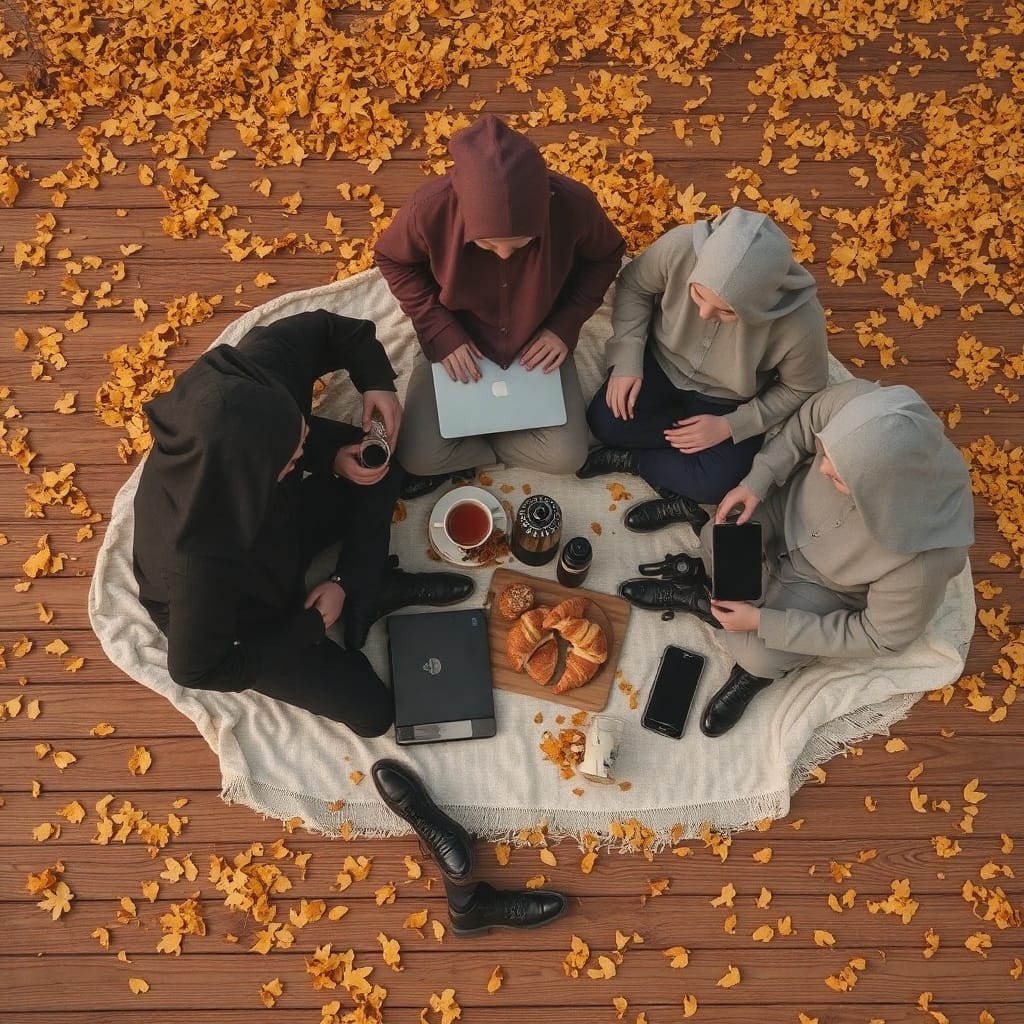From Individualism to Unity
In today’s era of rapid urban development and technological advancement, it is crucial to acknowledge a growing trend where many individuals are driven towards individualism. Social media was celebrated because people widely believed that it would bring them closer to their loved ones. However, what actually happened was that it has distanced people from their actual world. Social media posts that place too much emphasis on ‘self-respect’ have exacerbated disconnection from the relationships, leading people to believe that “I will not approach the other person unless they approach me.”
I don’t condemn people for enjoying their own company and doing what makes them happy. But ahead of it lies a greater responsibility. The Hadith “Part of the perfection of one’s Islam is his leaving that which does not concern him.” [1] is applied to refrain from sins like gossiping, mocking, and conforming to practices that do not align with Islamic teachings. Suppose, even if people did not understand the Hadith, how alarming is it that they do not feel connected to their fellow mates in society?! How is it possible to be so indifferent, as if it “doesn’t concern” them, especially when they are enduring the severest of hardships?! How is it possible that we have stopped feeling, “The similitude of believers in regard to mutual love, affection, fellow-feeling is that of one body; when any limb of it aches, the whole body aches because of sleeplessness and fever.”?[2] Nonetheless, the Hadith on perfection of faith doesn’t apply to disassociating oneself from people to such an extent that one becomes oblivious to the duties towards their family, friends, neighbours and fellow beings.
I wonder: If the evil wrongdoers, in their efforts to strengthen their false ideologies, spend millions to advertise harmful products that lure people to buy and support them, and then use the capital to silence opposition, fund violent agendas, and perpetuate atrocities like genocide, mass murder, and other forms of oppression—how, in the face of such relentless adversity, can one even remotely justify adopting the hollow, attitude of “I will not approach others unless they approach me.” ?
Why is it that we fail to channel our efforts and devise strategies to instill a love for truth (Haqq) among people? Is it out of fear of being called ‘clingy’? And if that is the case, why do we fail to realize that, while the wrongdoers blatantly impose their evil beliefs through strategies that blind people into following them, we hesitate to put in efforts for the actual truth? Why do we lack motivation in this regard? When the wrongdoers do not shy away from their evil plots, why do we shy away from promoting Haqq, the actual truth?
It is widely argued that a believer is dignified and should, therefore, remain silent in the face of arrogant people. Undeniably, Allah says in the Qur’an, “And it has already come down to you in the Book [i.e., the Qur’ān] that when you hear the verses of Allah being denied and ridiculed, do not sit with them until they enter into another conversation. Indeed, you would then be like them. Indeed, Allah will gather the hypocrites and disbelievers in Hell all together.”[3] However, it is important to highlight that the command to leave such a group is given while they are engaged in mockery, but it does not imply refraining from resisting and demonstrating Islam through our actions.
As Allah says, “Repel [evil] by that [deed] which is better; and thereupon, the one between you and whom is enmity will become as though he was a devoted friend.” [4] Why is it that we only select the verses that satisfy our preferences, and not those that actually call us to action? The story of Prophet Nuh (A.S.) is exemplary in this regard. He did everything he could for over 900 years, as Allah mentions: “He said, ‘My Lord, indeed I invited my people [to truth] night and day. But my invitation only increased them in aversion. And indeed, every time I invited them that You may forgive them, they put their fingers in their ears, covered themselves with their garments, persisted, and were arrogant with great arrogance. Then I invited them publicly. Then I announced to them and confided to them secretly, and said, ‘Ask forgiveness of your Lord. Indeed, He is ever a Perpetual Forgiver.'” [5] Despite being rejected for so long, Prophet Nuh (A.S.) did not easily give up. So, how can we give up after just a few calls?
We must understand that the community is facing a huge crisis, one to which we could all pay a price—a price with no limitations. It could range from demolitions to lynchings, persecution, mass murders, and unimaginable suffering. It’s almost ironic how the global powers, who spin the world at their fingertips, are threatened by the very names of people from a community, going to great lengths to erase them. The powerful forces that perpetrate these injustices often fear the potential threat posed by anyone who might expose their actions or disrupt their systems, just because they believe in a particular faith.
It is understandable that some people, disillusioned by the harsh realities of life, may be unaware of the political dynamics and global threats that could affect anyone, anywhere in the world. Thus, these times, we must lower our guards of ‘self-respect’ to work on people and to aware them of grave realities. Because nothing is more important than our faith and the well-being of our fellow mates. Let others call us ‘clingy’ or ‘overly involved’, but eventually, they will realize how vital it is to stand together as a community. United, we can channel our efforts, strategize, and take meaningful action to resist the wrongdoers and confront the challenges that lie ahead of us.
However, before we can act effectively, it is essential that we enter the Makki era, a period when Muslims, a minority community took careful minute steps and understood the fundamentals of the community. Similarly, to achieve the same we must engage with people. It has been rightly said, “We are social beings and living in isolation is against our survival.” To build a strong, resilient community, we must maintain friendships, expand our connections, and get involved with those who stand on Haqq (truth).
In the end, I hope we will evolve into a society that not only knows one another but also celebrates joy together and stands by each other through hardships and grievances. Let us strive to be a community that hosts, embraces, and supports one another—one that is approachable and fosters an environment of solidarity and mutual care. May we rise from the Makki phase to the Madani phase, just as the Muslims did, standing united and victorious.
[1] Hadith 12, 40 Hadith an-Nawawi
[2] Sahih Muslim, Book 45, Hadith 84, Sahih Muslim 2586a.
[3] Quran 4:140
[4] Quran 41:34
[5] Quran, 71:5-10

